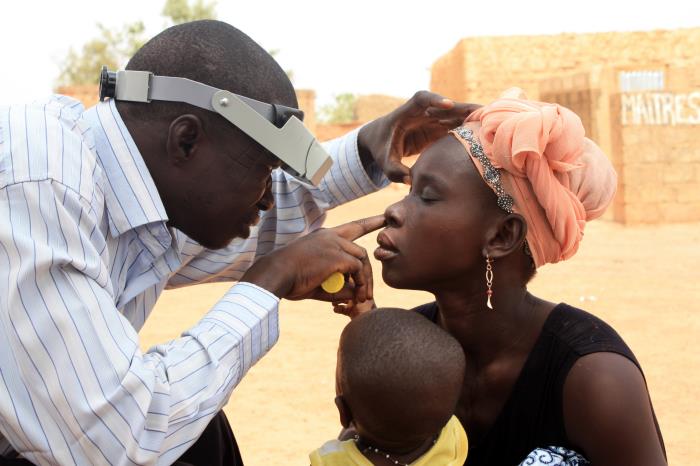Vision loss is a major global health issue that affects 1.1 billion people around the world.
People of all ages are at risk, but the burden tends to be greater in rural areas and people with disabilities, ethnic minorities, indigenous populations, people over 50 years old, and women. In fact, 55% of people with vision loss are women and girls.
Globally, vision loss is unequally distributed, and is felt more deeply and has greater socio-economic and social repercussions in low- and middle-income countries. In fact, 90% of people with vision loss live in low- and middle-income countries.
Francophone, or French-speaking, Africa – the region in which OPC has worked for over 40 years – receives significantly less foreign aid funding to restore sight and provide quality eye care compared to English-speaking African countries, which means that Francophone Africans are particularly vulnerable to the negative impacts of vision loss.
What is vision loss?
We define vision loss as any reduction in a person’s ability to see. This can include blurred or cloudy vision, double vision, blind spots, poor night vision and loss of peripheral vision. Vision loss has varying degrees of severity; it may affect one or both eyes, be partial or complete, and occur suddenly or gradually over time. Blindness is the state of being unable to see due to injury, disease or genetic condition.
Globally, the primary causes of vision loss are uncorrected refractive errors, cataract, glaucoma, age-related macular degeneration and diabetic retinopathy.

Why are vision loss and avoidable blindness a global health issue?
In the developing world, partial vision loss or total blindness can have major and long-lasting effects on all aspects of a person’s life, from their daily personal activities to interacting with their family and community. School and work opportunities may be missed and ability to access public services is more difficult.
In addition to the impact on the person with vision loss, it also affects their families who must provide care and support, often with limited resources. In turn, this creates a social, socio-economic ripple effect that is felt beyond the family on a community, regional and national scale.
Addressing vision loss and ending avoidable blindness improves the economy, equality and development of a country, and at the same time reduces its financial and social burden.
According to the latest International Agency for the Prevention of Blindness (IAPB) Vision Atlas report, 90% of vision loss is preventable or treatable, up from 75%. This means that millions of people live with vision impairment or blindness that do not need to, and that for millions more cases, vision loss is an issue that can be solved if people have access to proper treatments and eye health resources.
Safe, cost-effective, proven solutions to vision loss already exist, like eye exams, glasses and cataract operations. Just these three solutions could alleviate the vast majority of vision loss around the world.
Fighting vision loss and avoidable blindness at OPC
OPC works as an active partner in the fight against vision loss and avoidable blindness by:
- Establishing and/or strengthening eye care programs in French-speaking African countries.
- Increasing access to comprehensive eye health care services, especially to the most neglected communities.
- Empowering local teams of eye health care professionals.
- Implementing processes to ensure the sustainability of eye health activities.
We know that good vision and eye health are fundamental to achieving the United Nation’s Sustainable Development Goals, and that is why we invest in inclusive eye health along with our trusted partners.
Inclusive eye health means ensuring eye care services are accessible and welcoming to all members of the community, including people with sensory, physical and intellectual impairments, and those with mental health conditions. It also means proactively ensuring that people with long term vision impairment access their right to wider opportunities in rehabilitation, health, education, livelihoods and social inclusion.
Investing in inclusive eye health is important because when you invest in eye health, you help improve wellbeing, success in education, and increase workforce and community participation. Good vision provides people greater economic opportunities for themselves and their communities, helping to break the cycle of poverty.
Join OPC and together let’s invest in inclusive eye health, so we can end vision loss as a global development issue.